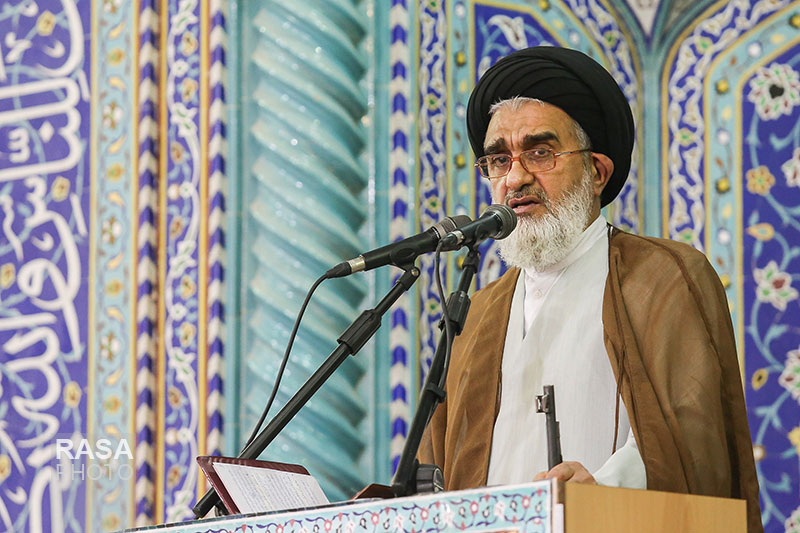
RNA – In his Friday prayer sermon delivered to a large and fervent crowd of believers in Qom’s Qods Prayer Hall, Ayatollah Sayyed Mohammad Sa’idi offered his congratulations on the anniversary of the arrival of Imam Khomeyni, the late founder of the Islamic Revolution, to Qom and also his condolences on the death anniversary of Umm al-Banin.
Referring to the importance of the culture of apology among the officials of Iran’s Islamic establishment, the custodian of the Holy Shrine of Lady Fatimah al-Ma’sumah said, “The statements and guidelines of the Supreme Leader of the Islamic Revolution [Ayatollah Sayyed Ali Khamenei] are derived from the Holy Quran, the tradition of the Prophet and the teachings and lifestyle of the Ahlul-Bayt. They are based on piety, enlightenment, insight and self-purification and embody very high mystical, ethical and social concepts in the field of management and politics.”
He stated, “Society, in its management practice, especially the senior officials of the establishment, must consider the path of the Supreme Leader of the Revolution as a lesson and example for their actions. This is a path which is based on the Quran, Islam and the Ahlul-Bayt. The culture of apology among the people, alongside sincere service, love and compassion for the people, is derived from the culture of the Ahlul-Bayt.”
Ayatollah Sa’idi noted, “The culture of apology is not derived from the Western or Eastern management establishments. By looking at the word ‘uzr,’ meaning ‘excuse or apology,’ and its derivatives in the Quran, it is clear that apology is not solely about one’s incorrect acts, but sometimes an apology from a manager and official is due to an incorrect action that is performed under his supervision.”
The representative of the Supreme Leader in Qom added, “The recent apology of the Supreme Leader is due to the ineffectiveness and blameworthy and negligent officials. The apology of the Leader in regards to the ineffectiveness of the officials has roots in divine culture. Whenever man errs, he must apologize and when someone apologizes to him for their own actions, he must accept their apology.”
He added, “The dignity and credibility of the Islamic Republic depends on the efficiency of officials. Those who seek excuses, justification, and pretexts do not pursue their academic and practical abilities, while the levels of managerial efficiency must be increased and they must not seek justification and excuses.”
Ayatollah Sa’idi said that apologizing has conditions including good intentions and added, “The apologist must really try to correct his mistakes and the apology must be made at the beginning of a move to reform his actions. Another condition of apology is remorse for incorrect actions. Another problem is that the official must not repeat his mistake.”
His Eminence said, “Making amends and rectification for the past is another condition of apologizing. If it is said that the importation of contraband goods from official and unofficial sources is a mistake, the importation of unnecessary goods is inconsistent with the Resistance Economy and the 2030 Agenda for Sustainable Development is contrary to Islamic culture, then officials must not be satisfied with the implementation and repetition of such mistakes.”
Qom’s Friday prayer leader stated that apologies must be timely and instead of being worthless, an apology must be based on honesty and not be a demonstration or to escape. The skill of apologizing is one of the most important managerial techniques which must be learned and it must also lead to growth and enhancement in the level of management.
In other remarks, he referred to Ayatollah Khamenei’s meeting with the Syrian Minister of Endowments, Muhammed Abdul-Sattar al-Sayyed, and a number of Syrian scholars on Thursday and said, “The Supreme Leader of the Islamic Revolution, while supporting and praising the Syrian people and President [Bashar al-Asad] for resisting against the arrogant powers, warned against the division of some of the countries in the region and said those who incite our Sunni brothers to act in opposition or speak out against Islamic unity, if they are not dependent on the politics of the arrogant powers, they must not give them attention. If they seek disunity, like the Saudis, which is a result of the politics of the arrogant powers, they must firmly confronted.”
Ayatollah Sa’idi added that in this meeting, the Supreme Leader insisted that we do not approve of the [Mi6] Shi’ah phenomenon which is supported by the United Kingdom and we do not consider the Sunni phenomenon which is supported by the United States, as Muslims “because Islam is opposed to infidelity, tyranny and hegemony.”
112/974